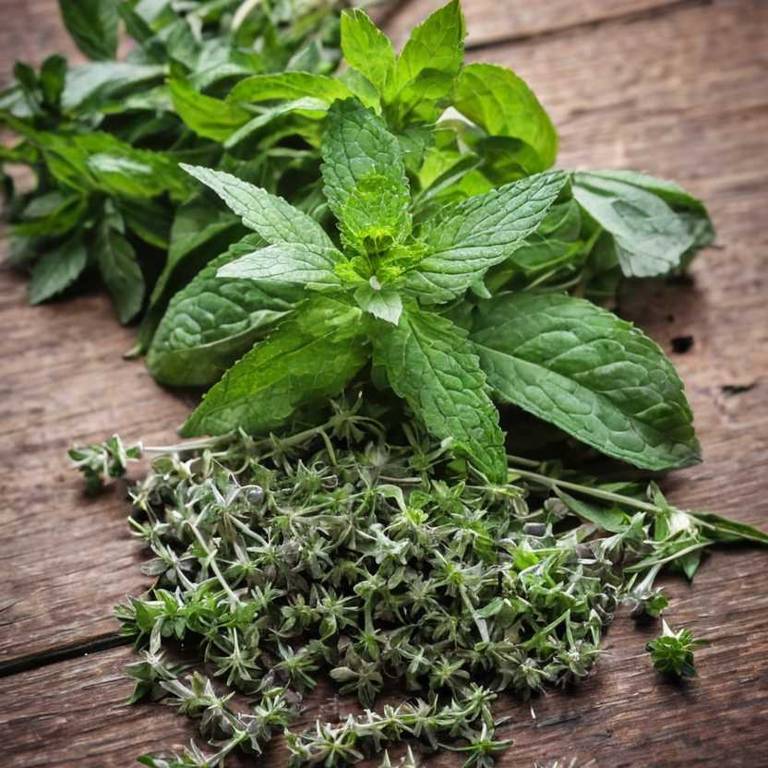10 Best Mentha Spicata Preparations

The best medicinal preparations of Mentha spicata are teas, decoctions, tinctures, essential oils, and oils, each offering unique therapeutic benefits.
Mentha spicata tea is commonly used to soothe digestive issues and relieve headaches.
A decoction involves simmering the dried leaves to extract its medicinal compounds, often used for respiratory support.
Tinctures provide a concentrated form of the herb, useful for treating inflammation and muscle pain.
Essential oils derived from the plant are valued for their aromatic and antiseptic properties, often used in aromatherapy and topical applications.
Oils infused with Mentha spicata are also used in massage and skincare for their cooling and refreshing effects.
Below there's a list of the 10 best herbal preparations of mentha spicata for medicinal purposes.
1. Teas
Mentha spicata teas is commonly used to relieve digestive issues, reduce stress, and alleviate respiratory symptoms.
This herbal preparation is widely recognized for its ability to treat ailments such as indigestion, nausea, headaches, and mild respiratory infections. The bioactive constituents responsible for its medicinal properties include menthol, menthone, and other volatile oils, which have antispasmodic, analgesic, and anti-inflammatory effects. Additionally, the tea contains flavonoids and phenolic compounds that contribute to its antioxidant and antimicrobial properties.
These components work together to provide a range of therapeutic benefits when consumed as a tea.

2. Decoctions
Mentha spicata decoctions is commonly used to relieve digestive discomfort, alleviate respiratory symptoms, and reduce fever.
This herbal preparation is frequently employed to treat ailments such as indigestion, nausea, coughs, and headaches. The bioactive constituents responsible for its medicinal properties include menthol, menthone, and other essential oils, along with flavonoids and phenolic compounds. These components possess antimicrobial, anti-inflammatory, and analgesic effects.
Additionally, the decoctions may help in promoting sweating and reducing body temperature during fevers.

3. Tinctures
Mentha spicata tinctures is commonly used to relieve digestive issues, headaches, and respiratory congestion.
These tinctures are often employed to treat ailments such as indigestion, nausea, and sore throats. The bioactive constituents responsible for its medicinal properties include menthol, menthone, and pulegone, which have antispasmodic, analgesic, and anti-inflammatory effects. Additionally, the presence of volatile oils and flavonoids contributes to its soothing and calming properties.
This herbal preparation is valued for its ability to support both digestive and respiratory health.

5. Oils
Mentha spicata oils is commonly used to relieve digestive issues, headaches, and respiratory conditions.
The most common medicinal uses of this herbal preparation include treating nausea, indigestion, migraine headaches, and symptoms of colds or asthma. It is also used to alleviate muscle pain and improve mental alertness. The bioactive constituents responsible for its medicinal properties include menthol, menthone, and pulegone, which have cooling, antispasmodic, and anti-inflammatory effects.
These compounds contribute to its ability to soothe the body and mind.

6. Creams
Mentha spicata creams is commonly used to relieve symptoms of skin irritation, muscle pain, and inflammation.
These creams are widely applied for treating conditions such as eczema, psoriasis, and minor burns due to their soothing and anti-inflammatory properties. The most common medicinal uses include alleviating headaches, reducing fever, and easing digestive issues like indigestion and nausea. The bioactive constituents responsible for these effects include menthol, menthone, and limonene, which have cooling, antiseptic, and analgesic properties.
These compounds work together to provide a calming and therapeutic effect on both the skin and the body.

7. Syrups
Mentha spicata syrups is commonly used to relieve symptoms of respiratory conditions such as coughs, colds, and bronchitis due to its soothing and expectorant properties.
The most common medicinal uses of this herbal preparation include treating respiratory tract infections, reducing inflammation, and alleviating digestive issues like indigestion and nausea. It is also used to freshen breath and ease symptoms of headaches and migraines. The bioactive constituents responsible for these medicinal properties include menthol, menthone, and other volatile oils that have antispasmodic, analgesic, and antimicrobial effects.
Additionally, the presence of flavonoids and phenolic compounds contributes to its anti-inflammatory and antioxidant activities.

8. Capsules
Mentha spicata capsules is commonly used to relieve digestive discomfort, reduce fever, and alleviate respiratory symptoms.
The most common medicinal uses of this herbal preparation include treating indigestion, nausea, headaches, and inflammation. It is also used to soothe sore throats and ease symptoms of colds and coughs. The bioactive constituents responsible for its medicinal properties include menthol, menthone, and various phenolic compounds.
These components contribute to its antispasmodic, anti-inflammatory, and cooling effects.

9. Lozenges
Mentha spicata lozenges is commonly used to relieve symptoms of respiratory tract infections, such as sore throat, cough, and bronchitis.
These lozenges are also used to freshen breath and reduce inflammation in the mouth and throat. The most common medicinal uses include treating colds, flu, and other upper respiratory conditions. Bioactive constituents such as menthol, eucalyptol, and various phenolic compounds contribute to their medicinal properties.
These compounds have antimicrobial, antispasmodic, and analgesic effects, making the lozenges effective for soothing irritation and reducing pain.

10. Oinments
Mentha spicata oinments is commonly used to relieve symptoms of respiratory conditions, skin irritations, and muscle pain.
These oinments are often applied topically to treat ailments such as coughs, sore throats, headaches, and inflammatory skin conditions like eczema or psoriasis. The most common medicinal uses include alleviating congestion, reducing inflammation, and providing a cooling sensation to the skin. The bioactive constituents responsible for these effects include menthol, menthone, and other volatile oils that have antiseptic, analgesic, and anti-inflammatory properties.
These compounds work synergistically to provide the therapeutic benefits associated with Mentha spicata oinments.
